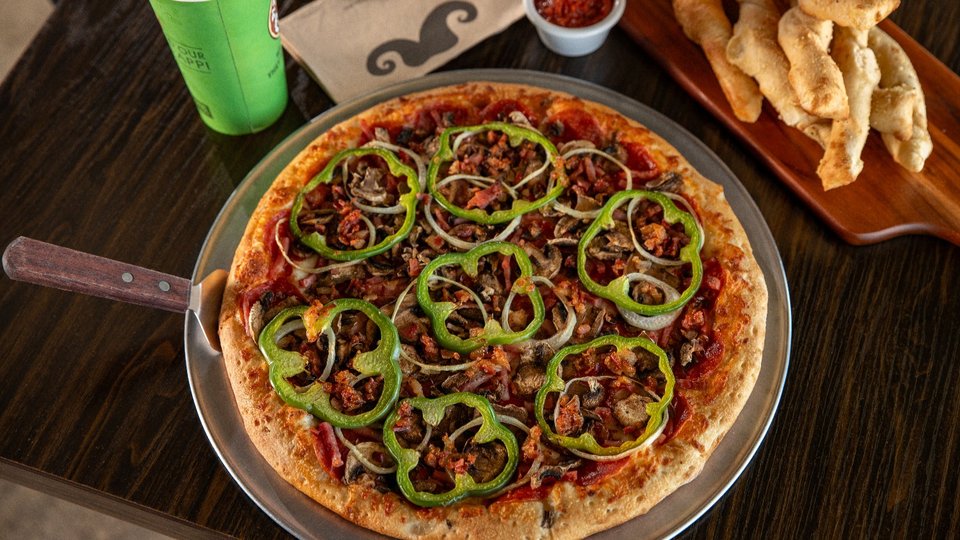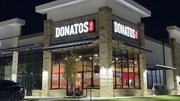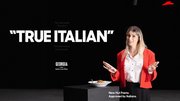Operations
Pizza Factory's culture, ethos builds solid company with individuality
Pizza Factory owner and franchisee Mary Jane Riva shares insight on menu strategy and store models.

April 4, 2024 by Mandy Wolf Detwiler — Editor, Networld Media Group
Pizza Factory has been around a long time, but if you're just now learning about them, that's because they're a mainly West Coast regional chain.
 |
Mary Jane Riva co-owns Pizza Factory and is still a franchisee. Photo: Pizza Factory |
The brand was started by two men who each opened their own Pizza Factory stores in 1978 and began franchising in 1985. In 1990, Mary Jane Riva and her husband became Pizza Factory franchisees. They purchased the brand in 2012.
Today, Pizza Factory has 114 restaurants with two opening soon. Just one is a corporate store in Arizona. The brand is located Washington, Idaho, Nevada, California, Arizona, Texas and Georgia.
Riva is still a franchisee. She said the brand has several models, including a full-dining experience and an express version. "Sit-down is primarily our model," Riva added.
On the menu
Pizza Factory doesn't use a commissary, and everything is made at each store, including dough. Nothing's frozen.
"Our dough has to rise for two days," Riva said. "We do still hand toss it. Our meat sauce and everything is made from scratch. It's for quality and we have a proprietary seasoning that goes in our dough and our sauce that makes the flavor. We just don't skimp on toppings, and it's just where the quality's always been."
It's important that the brand not lose sight of their roots and who they are in a new era of competition and choices, Riva added. "We stick with what we know we do best."
Riva admits maintaining continuity across the brand as it grows can be challenging. Store checks and best practices help Pizza Factory locations be consistent from one unit to the next while at the same time retaining their individuality.
The top-selling pizza is The Factory Special which features pepperoni, ham, mushrooms, onion, bell peppers and bacon. Specialty chicken pizzas that feature hot honey or barbecue sauce are also popular.
"We try to bring in every now and then something new for the local communities," Riva said. "There's so many combinations you can make with pizzas… We just try to make sure that we're hitting all tastes out there and hitting (customers) with special needs, whether it's a cauliflower crust or gluten free."
Pizza accounts for 80% of sales, with beer and wine weighing in at 6% of sales.
Pizzas are baked in XLT conveyor ovens for speed and continuity.
Operations
Ninety percent of franchisees are organic. They were either customers, family members or franchisees who have opened up multi-units. "We draw a lot from the familiarity of our brand because (franchisees) have a connection to it," Riva said.
The brand started off in small towns but has moved to larger cities as it has grown.
"We're really involved in community," Riva said, including schools and GiftAMeal, where customers take pictures of their meals and load it to a website. For every photo uploaded, GiftAMeal donates a meal to the local food pantry in that town.
Stores are primarily owner operated, and franchisees have a sense of pride in their own units. Staying connected to the community is part of the brand's ethos. "A lot of times the owners are so engaged that a lot of the towns don't even realize we're a franchise," Riva said.
The brand is kid friendly, and they've built an anti-bullying campaign with talking points for parents and their children on the kids' menus. "Being engaged in what's going on in their community (is important) so they guest feels like this is their pizza place," Riva said.
 |
Photo: Pizza Factory |
Challenges
The biggest challenge for Pizza Factory, Riva said, is trying to bring in technology across the brand. Though Pizza Factory is a smaller-sized company, they try not to operate like one. Instead, they want to play with the big boys in terms of tech like loyalty apps, social media, texting and POS integration. The goal is not to lose the interpersonal relationship with guests and employees.
Trying to de-clutter what franchisees are already dealing with on a daily basis and incorporating technology is also a goal for the brand. "We're trying not to overwhelm (franchisees) with all the technology that's out there right now," Riva explained.
Culture
The Friends Are Awesome anti-bullying program also extends to employees. "We want to make sure that everybody who works at a Pizza Factory is treated the same regardless of who they may know at school or what groups they're in."
There's an annual scholarship program that employees can apply every year.
Riva said part of the culture is acknowledging team members who are on the front lines for their parts in making Pizza Factory successful. "It's not just our owners. It's not just the food," Riva said. "It's finding ways to identify those people who have been working for some of the stores for 30 plus years, making sure we identify them, not just the franchisee."
Transparency is important to Riva, as is communicating with the franchisees. Pizza Factory has a four-day training program for managers, and franchisees can send their managers to that free of charge.
Continuing to post and show best practices is important as well.
Growth
Two stores are expected to open soon, and three have already opened this year alone. Pizza Factory opened 10 restaurants last year. Six total are planned for 2024.
"The growth is happening, but we're not on a schedule where we have to meet this number," Riva said. "We just want to make sure we have the right people and the right places, especially in California right now … with everything going up so much. We're privately held. We're not owned by anybody else, there's no private investors, so we don't have that pressure of having to build a lot of stores."
About Mandy Wolf Detwiler
Mandy Wolf Detwiler is the managing editor at Networld Media Group and the site editor for PizzaMarketplace.com and QSRweb.com. She has more than 20 years’ experience covering food, people and places.
An award-winning print journalist, Mandy brings more than 20 years’ experience to Networld Media Group. She has spent nearly two decades covering the pizza industry, from independent pizzerias to multi-unit chains and every size business in between. Mandy has been featured on the Food Network and has won numerous awards for her coverage of the restaurant industry. She has an insatiable appetite for learning, and can tell you where to find the best slices in the country after spending 15 years traveling and eating pizza for a living.
 ChatGPT
ChatGPT Grok
Grok Perplexity
Perplexity Claude
Claude








